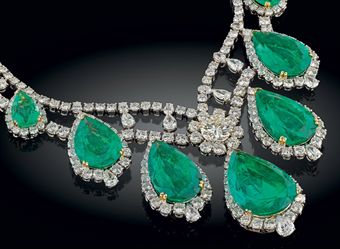October Jewel of the Month 2010
The Emerald and Diamond Necklace
Designed by Jahan
SOLD
Magnificent Emerald & Diamond Necklace
The Estimated Value - $ 180,000 - $ 250,000 USD
The Price Realized - $ 314, 500 USD
This magical Jahan Emerald & Diamond necklace that sold at auction on the 27th of October 2010 would turn emerald gemstone lovers around the world green with envy!
For October Jewel of the Month on Antique Jewelry Investor features a fairy-tale emerald and diamond necklace which was part of a set of jewels auctioned at Christie's Auction House in Dubai on the 27th October 2010.
Christie's in collaboration with Persian Jewelers returned to the joy-de-Vivre of the
post World War II 'New Look' of Ballgowns and Parures. The New Look created a revolution in fashion and jewelry. After years of war and brutality, the world was ripe for change. Dior's 'New Look' reminiscent of the Belle Epoque ideal of long flowing skirts, tiny waists, fabrics that mother had worn in the early 1900s and Jewelry Parures.
Sumptuous jewelry & parures sold in Dubai at Christie's Auction October 2010, like the emerald and diamond necklace featured on this page. Created by designer jeweler, Jahan. The firm Jahan is one of the most prestigious jewelers in the Middle East and has been in family hands for generations. Their superb jewels have given them opportunities to create rare objects of astonishing beauty for the Middle Eastern elite, dignitaries and royalty.
This magnificent necklace was part of a suite of jewels and embellished with very large pear-shaped Colombian emeralds weighing a total of 158 carats. The necklace is made in 18k white and yellow gold and signed by Jahan.
The collection was auctioned at the Jumeirah Emirates Towers, Dubai at 7 pm on the 27th of October 2010 and consisted of 40 parures, either set with Sapphires & Diamonds, Emeralds & Diamonds, Rubies and Diamonds, Pearls and Diamonds or set with Diamonds on their own.
Reference:
David Warren, Senior Director, Jewellery, London and Head of Jewellery, Christie's Middle East
Post-War Romance
Return of the Ballgown & Parure
The idea of sets of jewels consisting of necklace, ring, brooch, earrings and sometimes a tiara goes back to Roman times. It was not until the 17th century that the word "parure" was first applied to a set of three or more matching pieces of jewelry.
From the 18th to the early 20th century, parures became more elaborate and reflected the fashions of the day. Decorated en-suite with different gems or made of the same variety of gemstone, each piece in the set of a parure was intended to be worn at the same time. The modern term is sometimes called a "suite". Less than a full set is called a "demi-parure".
After the first world war costume jewelry designers like Chanel advocated a more simple, liberal form of dress that made the parure redundant.
Change is the only constant. After the second world war, Christian Dior's 'New Look' caused a global revolution in fashion and jewelry. Parures of jewelry began to become fashionable again as Christian Dior from France led the world back to the joy-de-Vivre, ball gowns, fabrics, fashion and jewelry parures of a pre-war era.
At this auction, it was Christie's turn.
References:
Photo Courtesy of Christie's Auction House.
http://www.christies.com/features/7896_17-982-4.aspx
Information on Christian Dior can be found at:
http://design.designmuseum.org/design/christian-dior
Return to the top of October Jewel of the Month 2010
Return to Jewel of the Month
Return to Antique Jewelry Investor Home Page

